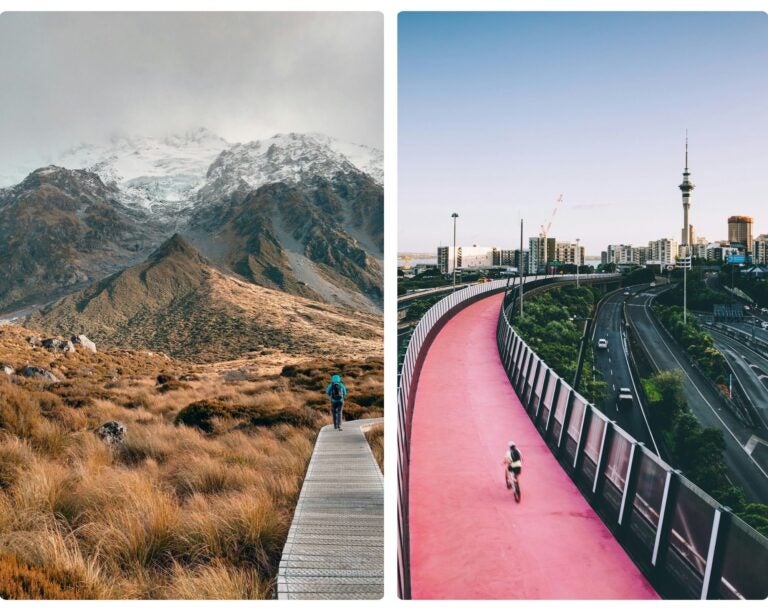Student visa for New Zealand: Requirements & process
Find here the most relevant information about the student visa for New Zealand, requirements, benefits, prices and more.
This article covers everything you need to know about applying for a student visa for New Zealand. Known for its high-quality education, stunning natural landscapes, and warm, welcoming culture, New Zealand is an ideal destination for international students looking to study and explore in a truly unique setting.
In this guide, we’ll walk you through requirements, how to apply, a step-by-step process, available alternatives, and of course, the benefits of each type of visa. We hope this destination allows you to gain valuable work experience while you study, as New Zealand has flexible policies for international students. And while you’re there, stay connected with HolaFly’s eSIM and data plans, trusted by millions of travelers worldwide.
When do you need a visa to study in New Zealand?
If you’re planning to study in New Zealand for more than three months, you’ll need a student visa. This applies to a wide range of academic programs, including:
- Language programs: Intensive English language courses to improve your language skills.
- Technical or vocational programs: Certificates and diplomas aimed at developing specific skills in areas such as technology, tourism or health.
- University studies: Bachelor’s, Master’s or PhD degrees at recognized New Zealand institutions.
- Exchange programs: Student mobility between universities in your home country and New Zealand.
For courses that last less than three months, you may be able to study using a tourist visa or even without one, depending on your nationality. But if your goal is to enroll in full-time studies or take advantage of work opportunities during your stay, you’ll need to apply for a student visa.
Types of visas to study in New Zealand
New Zealand offers several student visa options, depending on the type of course you choose and how long you plan to stay. Here are the main ones you should know about:
Student Visa in New Zealand
This is the main visa for anyone planning to study in New Zealand for more than three months. It’s intended for full-time students enrolled at government-approved institutions. Key features include:
- Allows full-time study at any educational level, from languages to postgraduate studies.
- It grants the right to work up to 20 hours per week during the academic period and full time during official vacations.
- Can be extended or renewed if you wish to continue your studies.
This visa is perfect for those looking for a well-rounded educational experience that blends academic learning with work opportunities and cultural immersion.
Visitor Visa with permission to study in New Zealand
Although this isn’t a student visa, it’s a great option for those wanting to take a short course of up to three months. It’s especially suited for intensive programs or quick specialty courses. The main features of this visa include:
- It does not allow you to work during your stay.
- Perfect for those who wish to experience life in New Zealand for a limited period of time.
- It is simpler to process compared to a Student Visa.
This option works well for those interested in short-term programs without long-term work or study commitments.
Benefits of visas to study in New Zealand
Studying in New Zealand on a student visa gives you access to quality education along with a range of extra benefits:
- Work permission while studying: A student visa lets you work up to 20 hours a week during your studies and full-time over holidays. This not only helps with living costs but also gives you valuable work experience in an international setting.
- Possibility to include your family: Certain visas allow your partner and children to join you while you’re studying. Your partner may be eligible for a work permit, and your children can attend primary or secondary school as temporary residents.
- Post-study opportunities: New Zealand provides specific visas for graduates who want to stay and work after completing their studies. These visas make it easier to transition from student life to a professional career in the New Zealand job market.
- Access to quality services: As an international student, you’ll have access to top-quality healthcare services, provided you have insurance approved by local institutions.
- Multicultural environment: New Zealand is known for its diversity and welcoming spirit. Studying here gives you the chance to connect with people from all backgrounds, enriching both your personal and professional life.
Student visa in New Zealand: What is it for?
The Student Visa is the primary choice for those planning long-term studies in New Zealand. It’s designed to provide access to quality academic programs at government-approved institutions. Some of the key benefits include:
- Allows you to study full time at any approved educational institution.
- Right to work during your studies: Up to 20 hours per week during the academic period and full time during official vacations.
- Possibility of renewal: Should you wish to continue with another course or advance to a higher academic level.
- Access to quality basic services: Including compulsory health insurance and student activities.
- Ease of transition to a post-study visa: Great for those who plan to work in New Zealand after graduation.
This visa is suitable for those seeking a complete educational experience with job opportunities to complement their learning.

Visitor visa in New Zealand: What does it allow you to do?
The Visitor Visa with study permission is a flexible option for those looking to take short courses in New Zealand. While it’s not specifically designed for students, it offers several benefits for those planning a brief stay:
- Take part in short-term courses: Such as intensive courses or specialized workshops, as long as the program lasts less than three months.
- Explore New Zealand as a tourist: It allows you to combine studies with the opportunity to visit the main destinations of the country.
- Simpler process: Compared to a Student Visa, the application process is usually less complex.
A great alternative for those looking to improve their skills in a short period of time without committing to long term programs.
Requirements to be fulfilled for each type of visa in New Zealand
Before applying for a student visa, it’s important to understand the specific requirements to make sure you meet all the necessary conditions.
Requirements to be eligible for a student visa in New Zealand
To obtain a Student Visa, you must meet the following criteria:
- Enrolment at an approved institution: You need to be enrolled full-time at a government-approved educational institution in New Zealand.
- Proof of sufficient funds: Show that you have at least $12,000 per academic year to cover your living expenses.
- Medical insurance: You must have an approved insurance policy that covers your entire stay in the country.
- Valid passport: Valid for the duration of your course.
- Medical and police certificate: In some cases, proof of good health and clean criminal record is required.
- Payment of the application fee: Pay the corresponding fee.
Requirements to be fulfilled to apply for a visitor visa in New Zealand
If you opt for a Visitor Visa to study a short course, these are the main requirements:
- Duration of the course: The program must last less than three months.
- Proof of financial means: Proof that you can afford to pay for your stay with at least $600 per month or $250 if accommodation is paid for.
- Clear itinerary: Show your travel plan, including dates of entry and exit from the country.
- Medical insurance: Covering you for the entire duration of your stay.
- Valid passport: Valid for the duration of your visit.
Important: If you are a frequent traveler and want to stay connected without worrying about expensive roaming or looking for a new SIM at every destination, Holafly’s subscription plans are for you. With a single eSIM, enjoy internet in more than 170 countries for a fixed price and no surprises on your bill. Travel without limits and connect easily and securely! 🚀🌍

How to apply for student visas in New Zealand?
The application process can vary slightly depending on the type of visa. Below, we outline the general steps and required documents for each option.
Documents you must submit to obtain a student visa
- Acceptance letter: Issued by an approved educational institution.
- Proof of funds: Bank statements, sponsorship letters, or proof of scholarships showing you can cover your expenses.
- Valid medical insurance: Policies issued by recognized insurance companies in New Zealand.
- Passport: Original and copy with minimum validity for the duration of the course.
- Medical and police certificate: If your course is longer than six months, these documents may be required.
- Proof of tuition payment: Proof that you have paid your course fees.
- Completed application form: Available on the official New Zealand immigration website.
Documents you must present to obtain a visitor’s visa
- Course reservation: If you are studying a short program, you need a confirmation of the course.
- Proof of funds: Recent bank statements showing solvency to cover your stay.
- Medical insurance: Compulsory for the period of your visit.
- Valid passport: Original and copy with at least three months of validity after your departure.
- Travel itinerary: Plane tickets and detailed plan of your visit to the country.
- Completed application form: Available on the official New Zealand immigration website.
Note: Be sure to check in advance whether your nationality requires an interview or additional documents, as these requirements can vary depending on your country of origin.
Interviews and questions when applying for your student visa in New Zealand
Interviews aren’t always required when applying for a student visa for New Zealand, but they may be requested depending on the type of visa and your individual circumstances. If needed, interviews are typically conducted at embassies, consulates, or sometimes online.
In an interview, you are likely to be asked questions related to the following topics:
- Purpose of visit: Details about the course you plan to take, the duration of your studies and how they relate to your career goals.
- Financial solvency: How you plan to finance your stay, including study and living expenses.
- Post-study plans: The interviewer may ask if you plan to return to your home country after completing your studies.
- New Zealand connections: If you have family or friends in New Zealand and how they might influence your experience.
- Compliance with requirements: Confirm the accuracy of the documents provided, such as proof of enrollment, health insurance and financial funds.
Being open, truthful, and well-organized with your documents goes a long way. Showing up confident and ready can really set you apart.
Where to apply for visas?
There are a few different ways to apply for a student or visitor visa for New Zealand. Here’s a breakdown of your options:
New Zealand Immigration online platform:
- This is the most efficient and recommended method.
- You can access the official website (immigration.govt.nz) and complete the application form.
- The system allows you to upload documents in digital format, pay fees and track the status of your application.
At a New Zealand embassy or consulate:
- Best for those who prefer a face-to-face process or have difficulty with the online application.
- Embassies often offer additional guidance and allow you to submit physical documents.
- Check specific times and requirements before you go.
Visa application centers (VACs):
- Some regions have authorized visa application centers.
- These centers offer document scanning, biometric data collection and personalized attention.
Through an immigration agent or specialized attorney:
- Many people choose professional services to ensure that their application is correct and meets all requirements.
- Although this method involves an additional cost, it can be useful for complex applications.
Tip: Before starting your application, make sure to choose the option that best fits your location and personal situation.

How much does a visa to study in New Zealand cost?
The cost of a student visa for New Zealand can vary depending on the visa type and other application-related factors. Here’s a general idea of the fees involved:
- Application fee:
- The Student Visa costs an average of $315 when applied for from abroad.
- The Visitor Visa, on the other hand, costs around $145.
- Medical insurance: Having insurance is mandatory and must cover your entire stay. The average cost ranges from about $190-440 per year, depending on the coverage and provider.
- Medical examinations: If you plan to stay longer than six months, you’ll need to undergo a medical exam and, in some cases, additional tests like X-rays. The cost typically ranges from around $130-330.
- Translation and legalization of documents: If your documents aren’t in English, you’ll need to have them translated and, sometimes, certified. This process usually costs between $65-200.
- Other administrative costs: Include biometric data collection, which may cost an additional $30-60 depending on the region.
Please plan ahead and consider these costs in your overall budget.
How long does it take to obtain a visa to study in New Zealand?
Processing times for visas can vary based on factors like the visa type and the time of year you apply. Here’s a general estimate of the typical waiting periods:
Student Visa:
- Complete applications are usually processed within 20 to 45 working days.
- Complex applications or applications with additional documents may take longer.
Visitor Visa:
- Usually processed in 15 to 30 business days.
Other factors to consider:
- Interviews or additional requirements: If an interview or additional documents are required, it could add extra time to the processing period.
- Peak season: During busy periods, like the months leading up to the academic year, processing times may be longer.
To avoid delays, we recommend submitting the application at least two to three months in advance.
Lawyers for advice on how to apply for visas to study in New Zealand
Getting support from experienced professionals can make the visa application process much easier. Here are some top immigration firms and agents to consider:
NZ Immigration Advice
- Services: Full visa advice, document reviews and legal representation.
- Location: Auckland, New Zealand.
- Cost: Initial consultations from $90; customized packages available.
Pathways to New Zealand
- Services: Support in study, work and permanent residence visas.
- Location: Wellington and Christchurch.
- Cost: Plans from $120 per consultation.
Migration Associates
- Services: Specialists in student and professional visas.
- Location: Online and on-site in New Zealand.
- Cost: Free initial consultations; fees according to complexity of the case.
Note: Before hiring legal services, make sure to check credentials and past client reviews to ensure you’re choosing a trustworthy professional.
Frequently asked questions about visas to study in New Zealand
It’s a good idea to apply for your visa at least three months before your course starts to allow enough time for processing and any unexpected delays.
Yes, you can renew it if you wish to continue with another course or advance to a higher academic level.
Yes, the student visa allows you to work up to 20 hours per week during the academic period and full time during vacations.
Not directly, but it can serve as a first step to apply for post-study work visas that will bring you closer to permanent residency.
Yes, medical insurance is a mandatory requirement and must be in force for the duration of your stay.
You can appeal the decision or reapply after reviewing the reasons for the rejection and making the necessary adjustments.





 Language
Language 


















 No results found
No results found



